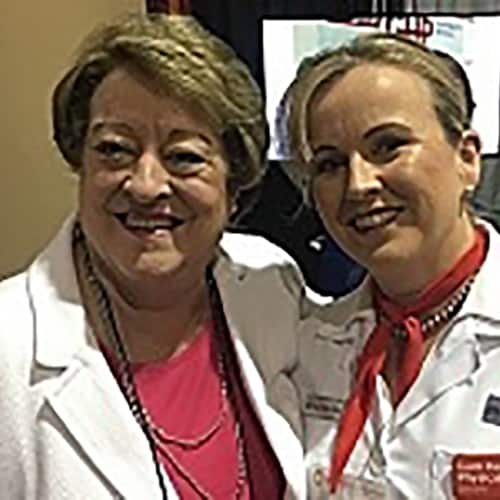Dental hygiene school provides future dental hygienists with essential clinical skills, but it's up to you to continue learning throughout your career. Networking and building a relationship with a mentor allows dental hygienists to share their knowledge and years of experience with each other. Anne Guignon, RDH, MPH is a dental hygiene mentor with decades of clinical practice and research experience. Jen Collins, RDH, is her longtime mentee and friend. Jen and Anne share how they met and how their friendship has inspired them to help their peers.
Interview
How did you meet your mentor?
Jen Collins: I first met Anne Guignon at the RDH Under One Roof conference in 2007. I was searching for loupes and someone guided me to Anne, an ergonomics expert. She presented me with my options, and from that point on she became my friend and mentor.
When I've been faced with difficult career decisions, Anne has suggested a range of options based on her long and diverse career. She also mentors many other members of the COHA community when they are struggling with clinical questions, and has a wealth of information.
What makes a good mentor in the dental field?
Anne Guignon: Mentoring is a complex and dynamic interaction between two people. A mentor does not have to be the smartest person in the room. Mentors need to be open, supportive and kind.
Ideally there is a respectful line of communication that lets two people learn from each other. My time spent with Jen, and so many other hygienists, is one of the best ways to support the future of our profession.
How does continuing education help dental hygienists succeed?
JC: Continuing education courses introduce dental professionals to new information and technologies that can help improve patient care. When I was in school, professional development through networking and continuing education seminars was touched upon, but as I became more experienced, I began to see the value of investing in myself. The more I invested in my career, the happier and more passionate I became.
For the past decade, a group of dental hygienists in my area has focused on attending at least one conference a year. As a team, we plan and budget our time together just as we do in our individual practices. Attending an educational event together is our career development highlight of the year. We even have a countdown calendar!
Why should dental hygienists network with others in the profession?
AG: Isolation in any profession, including dental hygiene, is dangerous. No one understands what dental hygiene is all about — the struggles, the victories and the specific challenges — as well as other hygienists do. The opportunity to network and learn from each other is a huge way to stay engaged and not get bogged down in stress or office politics. The COHA Community is a perfect example of how we can all learn from each other. We all face tough times, and it's nice to have a safe place to exchange ideas.
New dental hygiene school grads have lots of new knowledge, but they also have lots of questions. By answering a younger colleague's queries, seasoned hygienists can get a glimpse of the changing culture of dentistry, especially when faced with new techniques or products that were not around when they were in school.
What do you see for the future of dental hygiene?
JC: Dental hygiene is much more than "cleaning teeth!" Medical-dental integration is becoming more prevalent, and dental hygienists are becoming more involved in maintaining and caring for their patients' overall health.
AG: Dental hygiene is a health care profession: we serve people. That is what a person signs up for when they receive an RDH. We need to respect individual differences and earn the trust of our patients every time they walk into our treatment room. If they don't show up, we don't have a job. And that is so much more than a way to pay the bills. It is a rewarding and challenging career. But before we can really serve people properly, we need to take care of ourselves. Caring for ourselves by joining communities and supporting each other allows us to serve people in the best way possible.
Takeaways
- Keep learning! Continuing education will benefit your career.
- Stay connected and network with other dental professionals.
- Establish a relationship with a mentor who supports your goals.
Why It's Important
A strong mentor-mentee relationship can motivate you to achieve your career goals and can offer two colleagues the opportunity to learn from each other and build a lifelong friendship.
Image courtesy of Anne Guignon and Jen Collins


Was this article helpful?
If you’d like a response, Contact Us.